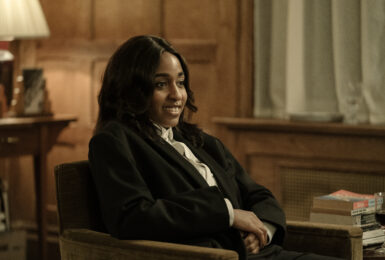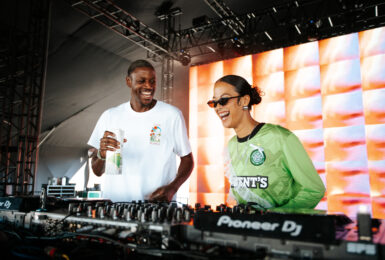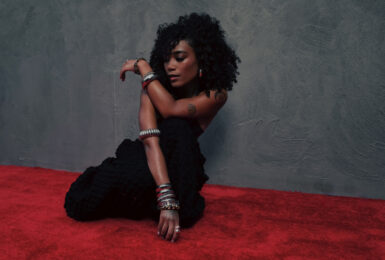
Music
afropunk interview: meshell ndegeocello
Whether or not you believe in neo-soul, neo-soul believes in you. Especially in 2019, when “alternative R&B” by artists such as Janelle Monáe, SZA, Solange and others, is ruling hearts and minds, charts and polls, all born of neo-soul. It was a genre birthed in the mid-1990s, and got its sobriquet when D’Angelo and Erykah Badu stormed urban radio; but its sound had antecedents, mid-wives and -husbands — the likes of Terence Trent D’Arby, Neneh Cherry, Seal, and a go-go bassist/vocalist from Washington D.C. by the name of Meshell Ndegeocello.
Twenty-six years after the release of her groundbreaking debut album, Plantation Lullabies, Ndegeocello continues to impact the culture. Since 2016, she’s been scoring the Ava DuVernay series, Queen Sugar, and all through January she is the artist-in-residence at the 15th annual Winter Jazzfest in Manhattan for which she is doing a string of separate and unique performances. Among these is “Thing Called Life,” Ndegeocello’s tribute to Prince, which reimagines favorites like “Pop Life,” “Love 2 the 9’s,” and other songs from his legendary catalog; as well as a reprisal of her 2016 off-Broadway show, Can I Get a Witness: The Gospel of James Baldwin, which re-contextualized The Fire Next Time in a church setting, with all the prophetic fire and brimstone that entails.
But during a quiet moment before bass practice, in the midst of the residency, Ndegeocello took a minute to connect with AFROPUNK, to discuss those projects, her career and her most recent record, 2018’s covers album, Ventriloquism.
Your Prince show, “Thing Called Life,” had its roots in “Gett Off,” your 2011 musical tribute to Prince. What’s your inspiration for honoring his music this way?
Love. Love for him has always been the inspiration. He is an inspiring force in my musical life.
Was there overlap between the “Gett Off” setlist and “Thing Called Life”?
I think the only one that was the same was “All the Critics Love U in New York.” But at this particular show, I really wanted to highlight [singer-songwriter and “Thing Called Life” collaborator] J. Hoard, so I thought I really would like some of the more uptempo tunes like “Let’s Pretend We’re Married.” I knew that [band-members] Justin Hicks and J. and Abraham [Rounds] really like singing multiple harmonies, and to me one of the most incredible songs Prince has ever written is “Tamborine.” I think the vocal harmony in there is just stunning, so I really wanted to do that.
A lot of the arrangements come from me, Justin Hicks and [bassist] Chris Bruce. We do it as a collective. But when you see [drummer] Deantoni [Parks] play as Technoself when it’s just him onstage, those are all his creations that come in free thought. There’s like improved breakbeat sort of situation. And all I try to do is curate a certain experience. I want to do it again. We would like to play a few of them differently. The sound was such a challenge there. At the Winter Jazzfest, we just couldn’t settle into our thing. I don’t think the venue was ready for what we were trying to do sonically. [laughter] But I felt it was a good start. I know how to make it better now I think.
The breakbeats Deantoni Parks created from Prince songs sounded incredible.
Yeah, Deantoni is like my muse. When I made The World Has Made Me the Man of My Dreams, it was mostly inspired by him. I think he is a brilliant musician. I wish him the best, always.
What’s been your biggest challenge scoring Queen Sugar?
I wish [Ava DuVernay] was open to different sound textures. I would like to develop it more. To get settled in a sound [is] probably why I won’t succeed in Hollywood, because I am never gonna be like, “This is the one sound I do.” That’s the only challenge for me. I’m really creative and I have a kinship with the characters. I mean, they’re just people I see on the screen, I don’t know them. But I have these feelings towards these characters, and I just wish I could enhance their sonic world. But it’s been the best experience. I worked on another show and I must admit I was taken aback. The thing I’d like to say about Ava and her team is, when you work with them, you feel a part of the team. You don’t feel like, “ah, you just do the music.” [laughter] Really kind men and women work there and it’s an amazing place to be involved with.
The trio of albums in 1999-2003 — Bitter, Cookie and Comfort Woman — sound like one of your creative peaks. What was going on during the recording of them?
I made some songs on Bitter with David Gamson, who produced the first two records [1993’s Plantation Lullabies and ‘96’s Peace Beyond Passion]. The record company was just like, “You can’t use him again. We don’t like it.” They didn’t like it and so they fired him. It was terrible. ’Cause that’s my friend, I love him. I would spend every day with him and we would make things. It was an amazing experience. He would allow me to hear music I’d never heard before, just really opened up my mind. So he got fired. I think I went into a deep well of depression.
But I’ve been so blessed to remember that I have people that love me, who’ve loved me since I was a child. So I called Craig Street, with whom I go back to the Black Rock Coalition days. And he had also worked with Norah Jones, Cassandra Wilson, all that stuff. So, we only had a little bit of the budget left and he was like, “What you doing? You’re surrounded by people who play amazingly!” That’s how I met Chris Bruce, after doing Bitter. I worked with Wendy & Lisa doing Bitter. I met Doyle [Brahmall], Abraham Laboriel Jr., who now plays with Paul McCartney. It was just like an amazing experience for me. And we did that record in a week! That was what was amazing.
I’d also just come off of that around the John Mellencamp thing [“Wild Nights”]. And I had been really submerged in highly produced music, where those first two records, I think I had a budget that allowed me to work on ’em for a year. And it was really just sitting and nitpicking and chopping stuff together, and I played everything. So it was like a different experience. But then, going making Bitter and the Mellencamp song, it got me back to “just pick up the bass and play it. Here’s the song. Play it live, there you go.” So that’s what Bitter is to me. But I had a horrible breakup. I found this new fantastic idea of love with the person, it was all just nonsense.
And so what was the aftermath of Bitter that led to Cookie?
[The record company] hated the record. They were like, “We can’t sell this.” It was horrible. I had people send the record back in the mail and ask for their money back. Exaggerating: only three people did. But yeah, it was terrible. So out of that, the next year I had a meeting with the record company and the record execs were like, “You need to start focusing.” And he literally spelled it out: “The K-I-D-S. You need to make black music.” And then gets the Billboard out and looks at who has the top five songs on the R&B chart. He’s like, “We’ll find you a producer.” They sent me to Norfolk for Teddy Riley. He didn’t show up. I went to Atlanta to try to work with the beatmaker from OutKast. He didn’t show up.
So I tried all these things, and then I made Cookie. It was supposed to have all these guest appearances with other black artists. That was a nightmare. So Cookie’s like a joke to me. That’s like my, “You know I’m making fun of you. Here’s the blackest record. How do you feel about this one?” [laughter] Like a jukebox, you think you can put a quarter in it and I play you whatever. So that’s the energy around that record.
And Comfort Woman?
Comfort Woman is like, I think I realized relationships were just another distraction from getting to know yourself. And so Comfort Woman is made out of, like: I’ve had all these experiences, they always lead to this one thing. And it’s after 9/11. That was a game-changing experience for me. I think my faith was shook and I was trying to find something else. I went very inward.
If you chose five songs for a Ventriloquism sequel, what would they be?
I think 60% of the songs on Ventriloquism were written by Terry Lewis and Jimmy Jam. To me, people like to talk about legacy: I think Terry Lewis and Jimmy Jam belong in the canon of the great American songwriters. They’ve written songs that we all know, love, have gotten married to, made babies to. When I stepped back and had to go get all the publishing information for the label, I was really shocked that most of the songs on there were written by them.
If I did more, I’ve been listening to the Pointer Sisters. “Automatic,” I would definitely go for that. I really love Kashif. I would like to honor him in some way. Babyface I love. I love the Waiting to Exhale soundtrack, I would like to delve into that maybe. I’m hating that it’s becoming my shtick, but I really like to sometimes look at people through music intentionally, and the man right now lyrically for me is George Clinton. I think people perceive him as this funk star, and no one’s ever listened to his propaganda. [laughter] So I would like to go deeper into that as well. “I Just Got Back” is one of the most amazing songs. “I’m glad to come back and help raise your kids…” It’s just a lyric you don’t hear a lot.
Get The Latest
Signup for the AFROPUNK newsletter




